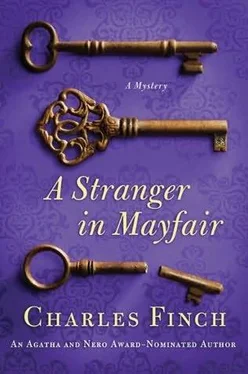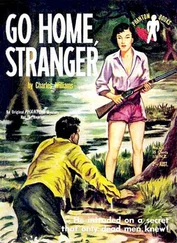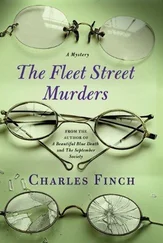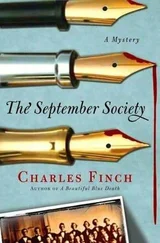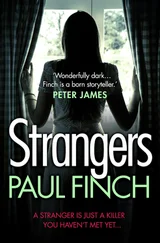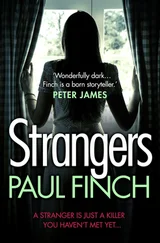Charles Finch - A Stranger in Mayfair
Здесь есть возможность читать онлайн «Charles Finch - A Stranger in Mayfair» весь текст электронной книги совершенно бесплатно (целиком полную версию без сокращений). В некоторых случаях можно слушать аудио, скачать через торрент в формате fb2 и присутствует краткое содержание. Жанр: Исторический детектив, на английском языке. Описание произведения, (предисловие) а так же отзывы посетителей доступны на портале библиотеки ЛибКат.
- Название:A Stranger in Mayfair
- Автор:
- Жанр:
- Год:неизвестен
- ISBN:нет данных
- Рейтинг книги:3 / 5. Голосов: 1
-
Избранное:Добавить в избранное
- Отзывы:
-
Ваша оценка:
- 60
- 1
- 2
- 3
- 4
- 5
A Stranger in Mayfair: краткое содержание, описание и аннотация
Предлагаем к чтению аннотацию, описание, краткое содержание или предисловие (зависит от того, что написал сам автор книги «A Stranger in Mayfair»). Если вы не нашли необходимую информацию о книге — напишите в комментариях, мы постараемся отыскать её.
A Stranger in Mayfair — читать онлайн бесплатно полную книгу (весь текст) целиком
Ниже представлен текст книги, разбитый по страницам. Система сохранения места последней прочитанной страницы, позволяет с удобством читать онлайн бесплатно книгу «A Stranger in Mayfair», без необходимости каждый раз заново искать на чём Вы остановились. Поставьте закладку, и сможете в любой момент перейти на страницу, на которой закончили чтение.
Интервал:
Закладка:
The detective’s heart went out to Alfred, whose face crumpled up as if he were going to cry. “I don’t think I had a single friend my first term at Oxford,” Lenox said. “That was years ago, but I expect it’s the same way now.”
“It only starts in the second term,” agreed Dallington.
“Is that true?” asked Paul, who apparently looked upon the word of a man who could drink five bottles of champagne in an hour as gospel.
“Oh, very true.”
“Hand over the flask,” said Elizabeth Starling.
Tiberius belched. “Tiberius Jr! Tibby!” he called out in a high-pitched voice.
“Not the cat, Uncle,” said Ludo despairingly.
In the cab back through Mayfair, after supper had reached its merciful conclusion, Lenox and Dallington laughed together over the night’s events.
“That family is a mess,” said the younger man.
“I don’t envy them that great-uncle of Ludo’s, rich as he may be.”
“Amusing old git, if you have the right sense of humor. Anyway, do you plan to heed their request?”
“That I leave the case alone?”
“Yes.”
“No, I don’t. Of course not. In fact I think we should go visit the dead boy’s mother in the morning.”
Chapter Eighteen
Hammersmith was a genteel, factory-scattered borough of London, some five miles west of Mayfair and situated on a turn in the Thames. As Dallington and Lenox rode out early the next morning, they continued their discussion of the evening at the Starlings’.
“Did you have a chance to spy on Collingwood?” asked Lenox.
“Unfortunately I was occupied with Paul, the younger son. He asked me a thousand different questions about pubs at Cambridge. I’d be surprised if his innards survive a month of King Street, with all the drinking he seems to have planned.”
Reminded by the word “drinking” that he had tea, Lenox took out his silver flask (a present from McConnell-its cloth case was in his family’s tartan) and took a long sip. “I wonder whether Collingwood is capable of violence. It seems so unlikely that he would kill Frederick Clarke over a few coins-a pound at the outside.”
“Who knows how important his position might be to him, or indeed whether there was something else between the two of them besides the money Collingwood stole. I’m going to see Ginger, Clarke’s friend, after we finish here. Perhaps he’ll know something more by now.”
They had pulled up to a low-slung sandstone building, which advertised itself on a small placard as the Tilton Hotel. This was where Mrs. Clarke had chosen to stay during her trip to London for the funeral. The entrance hall had a sort of shabby grandeur, with very nice furniture that was all worn at the edges, a floor of beautiful tiles that had gotten dingy, and attendants in fraying uniforms. Lenox registered the place in his head as a piece of evidence; it wasn’t the sort of place one stayed if one had tailored suits, as Frederick Clarke had.
A few moments later they were sitting with her in the tearoom next door. Lenox went to the counter and bought cakes and coffee, as well as a scone and jam for Mrs. Clarke’s breakfast.
She was a striking woman, nearly fifty but still slender and well dressed. Her hair was black and her face very alive, at once shrewd and playful-though now these characteristics were only half visible under an outer layer of grief. Her wide mouth was pinched with anxiety.
“Thank you,” she said when Lenox returned with the food. Her accent was less distinct than the average housemaid’s-perhaps through conscious effort. “Mr. Dallington has been telling me about your credentials as an investigator. Extremely impressive.”
“He plays a decent hand of cards, too,” said Dallington with a grin.
She smiled faintly. “I’m sure.”
“Is your hotel comfortable?” asked Lenox.
“Thank you, yes.”
“I’m sorry for your loss. By all accounts your son was a fine young man.”
“A good boxer as well,” said Dallington encouragingly.
“His letters were full of boxing, I do know that. Which makes it seem so unfair that he didn’t get a chance to fight back.” She brought her handkerchief to her mouth, her eyes suddenly stricken.
“Did he like his work, too?” asked Lenox.
“Yes, he seemed to.”
“He must have mentioned the people he worked with-Miss Rogers, Mr. Collingwood?”
“Only Mr. Collingwood.”
“In a negative light?”
“Not always. I sometimes thought they seemed quite friendly, though Freddie did mention that the butler could be strict with the staff. He wouldn’t have liked that.” She nibbled at her slice of lemon cake.
“What were his plans?”
“Excuse me?”
“Did he hope to continue on as a footman?”
“He spoke of university, in fact. The new place, not Oxford or Cambridge.”
For many centuries these had been the only two universities in England, but now others were springing up. “University College, do you mean? Here in London?”
“Yes, exactly. He said they offered a good education without all the snobbery. But just for the moment he was earning a decent wage and saving his money, I think. We never spoke about his plans, to be quite honest. I was always pleased for him to do whatever he liked. I only know he thought about university because we live in Cambridge, and when he visited me he said that he could never go anywhere like that-pointing at the university, you understand.”
“I didn’t realize you lived in Cambridge.”
“Yes, these several years, and before I worked in London as well. It’s where I grew up. My father was a gardener at Peterhouse.”
“Did you come to work for the Starlings because you met them in Cambridge, then?” asked Lenox.
She looked at him curiously. “Why would you think that? I came to work for the Starlings because they needed a housemaid and the hiring agency sent me there-you see, I had come to London because I wanted to see a bit of the world. I left when I inherited money from my uncle George and opened my pub. The Dove.”
“Did Frederick like the Starlings?”
“He never mentioned it. I imagine he did since he stayed so long.”
“Did you like working there?”
She shrugged. “I liked the girls on the alley-oh, yes, the one where Freddie died,” she said in response to Lenox’s surprised look. “We lived our whole life in that alley, the ten or fifteen of us. There was a great deal of gossip and chat. It pleased me to think of him there, running out for small errands and meeting people.”
“A community,” Lenox murmured.
“Yes, precisely.”
Lenox made a mental note to interview other people “on the alley”-not just the footmen who had been friends with the dead lad.
“Did he ever wear a ring, that you recall?” asked Dallington.
“No,” said his mother. “What sort of ring?”
“A signet ring? With a picture on the front, gold?”
“No.” She shook her head firmly. “Certainly not.”
“In your experience did he often have much money? When he came to visit you on his holidays, for instance?”
“Oh, dear, no-he saved his money, I think.”
“Did he dress differently after he moved to London? In a nicer suit, for instance?”
“Not at all. He had his old suits mended and wore them until they were threadbare. He always offered me money, though. Not that I needed it-the Dove does quite well-but still, the offer.” She took a sip of tea, and a slight smile came over her face. “You can’t imagine how wonderful he was to me. Mr. Clarke is dead, you see, and when Freddie came to visit he was so thoughtful-so considerate. What a nice boy he was.”
“There, there,” said Lenox. She had tears in her eyes.
Читать дальшеИнтервал:
Закладка:
Похожие книги на «A Stranger in Mayfair»
Представляем Вашему вниманию похожие книги на «A Stranger in Mayfair» списком для выбора. Мы отобрали схожую по названию и смыслу литературу в надежде предоставить читателям больше вариантов отыскать новые, интересные, ещё непрочитанные произведения.
Обсуждение, отзывы о книге «A Stranger in Mayfair» и просто собственные мнения читателей. Оставьте ваши комментарии, напишите, что Вы думаете о произведении, его смысле или главных героях. Укажите что конкретно понравилось, а что нет, и почему Вы так считаете.
